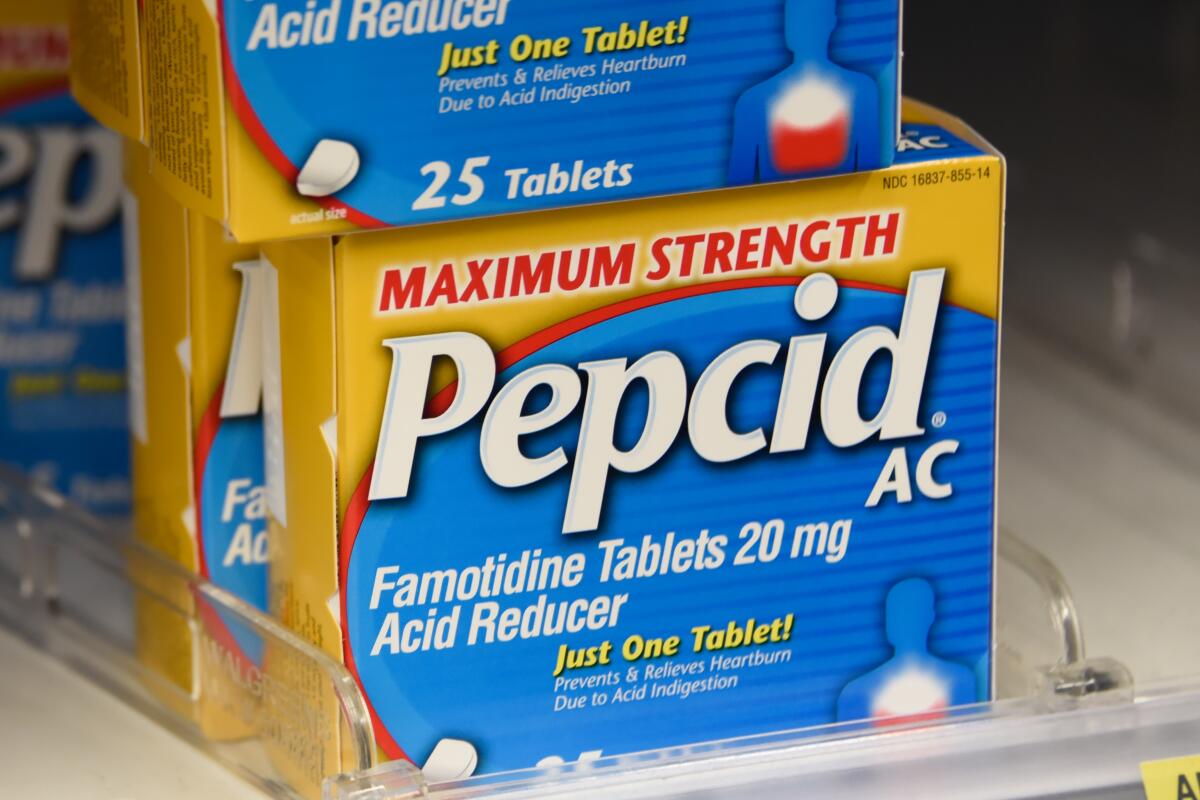Drugs for heartburn, gout and depression now being tested as coronavirus treatments

- Share via
In a race to find medicines that can tame the coronavirus and treat patients with COVID-19, researchers are scouring the formulary of available drugs and chemical compounds in hopes of finding something they could put to work immediately.
As a result, dozens of existing medicines have been waved through to clinical trials in record time. In roughly six weeks, the federal government’s running tally of registered clinical trials for COVID-19 treatments has swelled to 217. An additional 916 clinical trials of prospective coronavirus treatments have been proposed in other countries.
Remdesivir, a medication originally developed for Ebola, made news this week after clinical trial results showed it could shorten the recovery time for hospitalized COVID-19 patients by 31%. Dr. Anthony Fauci, head of the National Institute of Allergy and Infectious Diseases, said it was the first proof “that a drug can block this virus.”
But it will take much more than that to build up a reliable arsenal of treatments that includes options for patients at all stages of the disease, and with symptoms ranging from mild to life-threatening. So the trials will continue.
Some of the drugs being tested aim to protect lungs that are under assault from the coronavirus. Some would disrupt the virus’ entry into our cells, or stop it from replicating once inside. A few would aid the immune system’s initial response to coronavirus infection, and many more might help by tamping down the immune system when it goes into overdrive, a condition that is killing some critically ill COVID-19 patients.
More than 20,000 prescription medicines have received the Food and Drug Administration’s blessing to be marketed in the U.S., so there are plenty of candidates to consider. Here’s a look at the treatments that might have a second life as coronavirus combatants, and why they seem promising.
Protecting the lungs
In a serious case of COVID-19, the coronavirus reaches the lungs and causes acute respiratory distress. So looking for drugs that can protect the lungs is a no-brainer.
Researchers in the U.S. and Israel will be testing aviptadil, a component of the erectile dysfunction drug Procivni. Aviptadil is a synthetic form of human vasoactive intestinal polypeptide, which is highly concentrated in the lungs. It protects them from injury and prevents inflammation, and in laboratory animals it’s been shown to repair leakiness between the lungs’ tiny air sacs and the small blood vessels where the oxygen is transferred to the blood.
Vitamin C infusions have emerged as an effective way to protect the lungs from acute injury, as well as a powerful treatment for sepsis. Researchers in Virginia will test a three-day regimen of vitamin C infusions to see whether they prevent lung injury in seriously ill COVID-19 patients.
In New Orleans and New York, two cities hit hard by the coronavirus, researchers will test hyperbaric oxygen therapy on 48 COVID-19 patients requiring breathing assistance. Delivered in a full-body oxygen chamber, the treatment is thought to increase the amount of dissolved oxygen in the blood and promote its delivery to delicate tissues throughout the body. It may also reduce the intensity of the immune system’s inflammatory response and even kill the virus outright. Traditionally, the therapy has been used on scuba divers who get the bends if they surface too quickly; for COVID-19 patients, scientists hope it will reduce the time on — and even the need for — mechanical ventilation, and prevent kidney damage.
Tamping down immune overreaction
It didn’t take long for doctors to realize that for some COVID-19 patients, the immune system’s response to coronavirus infection was more dangerous than the virus itself. Now they’re eager to find drugs that can keep the immune system in check.
Colchicine tamps down inflammation in the tissues surrounding the heart, a condition known as pericarditis, and it reduces swelling and inflammation in patients with gout. A large trial in the U.S., Canada and Spain will test 6,000 patients at high risk of developing severe cases of COVID-19 to see whether colchicine reduces their odds of becoming critically sick. At UCLA, researchers will test the drug’s ability to reduce heart damage in COVID-19 patients who have already shown signs of cardiac injury.
The coronavirus outbreak has put science on hold. Now there are discoveries that may never be made and patients who will miss the chance at a breakthrough cure.
Ruxolitinib (marketed as Jakafi) is used to treat the rare blood cancer myelofibrosis and graft-versus-host disease, which causes a transplant recipient’s immune system to reject a new organ. It inhibits inflammation, reins in the body’s immune response and appears to induce the death of some kinds of cancer cells. Researchers in Denver and in St. Louis plan to test it as a way to reduce immune-system overreaction in COVID-19.
Etoposide (Etopophos) is a chemotherapy drug used to treat testicular cancer, lung cancer, lymphoma, leukemia, neuroblastoma and ovarian cancer. It’s also given to patients with hemophagocytic lymphohistiocytosis, a potentially fatal overproduction of immune cells with effects similar to those seen in many with COVID-19. Researchers at Massachusetts General Hospital in Boston will see whether it wards off cytokine storms when administered upon hospital admission and on Day 4.
Sirolimus (Rapamune) is an immune-suppressing drug taken to reduce rejection episodes in organ transplant patients. It will be tested in a small trial at the University of Cincinnati.
Enlisting drugs for rheumatoid arthritis
Many new drugs for this autoimmune disease are based on monoclonal antibodies, immune system proteins that are engineered to home in on their targets and turn them on or off. With COVID-19, the hope is turn off, or at least dial back, the body’s biological defense mechanisms.
Baricitinib (Olumiant) suppresses immune response by the same means as ruxolitinib. At University of Colorado Denver, researchers will conduct a small trial to test whether COVID-19 patients fare better on baricitinib than they do with usual care.
Regeneron Pharmaceuticals Inc. will test its drug sarilumab (Kevzara) in a large multi-center trial to see if its known action in rheumatoid arthritis — suppressing so-called cytokine storms, the inflammatory response implicated in COVID-19 — would reduce a key measure of inflammation and prevent hospitalization, mechanical ventilation or death.
Tocilizumab (Actemra) could ward off cytokine storms, and it will be tested in a small trial of newly hospitalized patients at the University of Chicago and in a large international trial sponsored by the drug’s manufacturer, Hoffmann-La Roche. In a small study in China, all 21 patients with severe or critical COVID-19 saw their body temperatures return to normal after treatment with tocilizumab, 15 reduced their need for supplemental oxygen within five days, and measures of inflammation returned to normal in at least half. Lung lesions cleared in 19 patients, and all 21 were discharged between 10 and 31 days after treatment, with no adverse reactions reported.
Disrupting cell entry or viral replication
In order for the coronavirus to do its dirty work, it must enter a host cell and make copies of itself. These drugs aim to stop one of those things from happening.
Camostat mesylate is used in Japan to treat reflux esophagitis and chronic pancreatitis. A protease inhibitor, researchers think it may disrupt the coronavirus’ ability to latch onto and enter into lung cells. In tests with infected mice, it reduced deaths from 100% to between 30% and 35%. Researchers at Yale will run a clinical trial with 114 participants to see if the drug suppresses viral load and reduces symptom severity in COVID-19 patients who start taking it within two days of diagnosis.
A common cough syrup ingredient has pro-viral properties and should be avoided by people infected by the coronavirus, scientists warn.
Losartan (Cozaar) and telmisartan (Micardis) are angiotensin receptor blockers used to treat high blood pressure. Because they dock at the receptors the coronavirus uses to latch onto and enter cells, these drugs may prevent the virus from gaining a toehold or causing serious damage to the lungs. A pilot study of telmisartan at the University of Hawaii will test whether it decreases disease severity if used early in infection. In San Diego County, losartan will be tested to see if it prevents patients from progressing to critical disease. The same drug will be tried in patients in Minnesota with mild and severe COVID-19 and in patients in Kansas with severe disease.
Leronlimab, the first of a new class of HIV drug and still in clinical trials, is thought to inhibit the coronavirus’ entry into cells and possibly to reduce the likelihood of a cytokine storm. In a pair of trials, Montefiore Medical Center in New York will test the drug in patients with mild and severe cases of COVID-19 to see if it improves symptoms and reduces the risk of death.
Who knows how they might work?
In some cases, clinical trials are proceeding even though researchers aren’t yet sure exactly how or why the drugs they’re testing might make a difference. They may have a chemical structure that seems to latch onto the virus. They may correct some factor that predisposes a person to becoming very ill, or intervene in some process that’s perturbed in COVID-19 patients.
Famotidine, the medication known to U.S. consumers as Pepcid, will be tested as a COVID-19 treatment under a $20-million Department of Defense contract. Case reports from China first noted that among COVID-19 patients at high risk of becoming critically ill, those who routinely took famotidine for gastric reflux fared much better than those who took a more expensive antacid of a different class. Doctors at Columbia University in New York picked up similar signals, and a pharmacological profiling group working for the Pentagon identified the drug as a compound capable of binding to a distinctive coronavirus enzyme, potentially allowing it to disrupt the virus’ action.
Tranexamic acid, or TXA, is a synthetic version of naturally occurring protein that helps the blood coagulate. It’s long been used to treat women with excessive menstrual bleeding and to stanch bleeding in surgery and trauma patients. One of COVID-19’s more mysterious symptoms is coagulopathy. That abnormality results in the formation of dangerous blood clots throughout the body, but in patients who are critically ill, it can cause hemorrhaging in some organs. University of Alabama researchers will conduct two trials to see whether the drug might help keep COVID-19 patients from becoming critically ill by righting the balance of coagulation factors.
Dapagliflozin (Farxiga) is a widely advertised drug taken by those with Type 2 diabetes to reduce the likelihood of hospitalization for heart failure. The drug’s maker, AstraZeneca, is sponsoring a large trial in Kansas City, Mo., to determine whether it might reduce rates of respiratory failure and other complications in COVID-19 patients with underlying conditions such as diabetes, cardiovascular disease, heart failure and high blood pressure.
Fluvoxamine (Luvox) is an antidepressant used mainly to treat obsessive-compulsive disorder. Its primary job is to boost the brain’s supply of serotonin, but it has many incidental effects. Researchers in St. Louis will enroll 152 patients to test whether the drug, when used early in COVID-19 infection, can prevent more serious complications such as shortness of breath.








